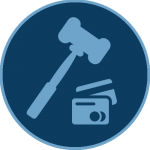Our credit report dispute agents have extensive experience in the credit, collections and mortgage industries, which gives us the background knowledge to accurately assess your credit report, and to determine the most viable method of completing an Equifax Dispute and/or a TransUnion Dispute!
Your credit report contains information about where you live, how you pay your bills, and whether you’ve been sued or have filed for bankruptcy. Credit reporting companies sell the information in your report to creditors, insurers, employers, and other businesses that use it to evaluate your applications for credit, insurance, employment, or renting a home.
A recent study has shows that 20% of consumers have an error on at least one of their credit reports!
Credit Dispute
Our Process is Simple
You Can Complete a
Credit Report Dispute
in Three Easy Steps
A recent study has shows that 20% of consumers have an error on at least one of their credit reports!
Our agents have extensive experience in the credit, collections and mortgage industries, which gives us the background knowledge to accurately assess your credit report, and to determine the most viable method of correcting and repairing your credit!
Once the process is completed, your credit score will increase immediately and you may then apply for new credit facilities without the risk of being declined due to inaccurate items on your reports.
We can help
Don’t let credit report errors prevent you from obtaining the financing you need!
Apply Today
Step 1. Provide us with a copy of your credit report(s)
- You can obtain your Credit Reports directly from Equifax and TransUnion
- We can also help you in obtaining a copy of both your Credit Reports
Step 2. Provide us with proof of the inaccuracies on your report.
An incorrect address or name spelling can be corrected with 2 pieces of Government issued identification.
A satisfied judgment can be corrected with a letter from the creditor showing the judgment has been satisfied.
A paid collection item can be corrected with a letter from the creditor stating that the account has been paid.
A non-discharged bankruptcy can be corrected with a statement from your trustee noting the completion of your bankruptcy.
Payments recorded a past due can be corrected with a bank statement or deposit slip showing the payment was made on time.
Step 3. We create a case using the documents provided and submit it to the credit reporting agency.
- Within 1 – 3 weeks of submission you will receive a letter in the mail outlining the corrections that have been made
Your credit score will increase immediately and you may then apply for new credit facilities without the risk of being declined due to inaccurate items on your reports.
Leveraging Equifax and TransUnion Disputes for Credit Score Enhancement
Equifax and TransUnion are two of the major credit reporting agencies that play a pivotal role in determining your credit score. If you find errors or inaccuracies in your credit reports from Equifax and TransUnion, initiating an Equifax dispute and TransUnion dispute can be a powerful strategy to potentially boost your credit score.
- Error Resolution: An Equifax dispute and TransUnion dispute process involves identifying and rectifying inaccuracies on your credit reports. These inaccuracies can include erroneous late payments, accounts that don’t belong to you, or incorrect credit limits. By challenging these errors through the credit report dispute process, you can have them corrected or removed from your credit reports, which can instantly improve your credit profile.
- Credit Utilization: Equifax and TransUnion reports contain vital information about your credit card balances and credit limits. An Equifax dispute and TransUnion dispute can help correct any discrepancies in these figures. Lowering your credit card balances relative to your credit limits can significantly impact your credit utilization ratio, which is a crucial factor in your credit score calculation. A lower credit utilization ratio can boost your credit score, as it demonstrates responsible credit management.
- Payment History: Payment history is another critical component of your credit score. If you discover inaccuracies related to late payments through an Equifax dispute and TransUnion dispute, getting these corrected can be a game-changer. Ensuring that your payment history is accurately reflected can improve your score and make you more attractive to lenders.
- Account Management: Equifax and TransUnion reports provide details about the types of accounts you have, including credit cards, loans, and mortgages. Ensuring that these accounts are correctly categorized and reported can positively influence your credit mix, which is another factor in your credit score calculation.
- Removing Negative Items: In some cases, negative items that are hurting your credit score may not belong to you or may be reported incorrectly. By initiating an Equifax dispute and TransUnion dispute to address these negative items, you can potentially have them removed, further enhancing your credit profile.
In conclusion, an Equifax dispute and TransUnion dispute can play a significant role in increasing your credit score. By identifying and rectifying errors, correcting credit utilization ratios, ensuring accurate payment histories, managing account categorizations, and removing negative items, you can take control of your credit and work towards achieving a higher credit score. It’s essential to monitor your credit reports regularly, address any discrepancies promptly, and maintain responsible credit habits to maximize the positive impact on your credit score. Remember, you can initiate a credit report dispute as many times as necessary.



